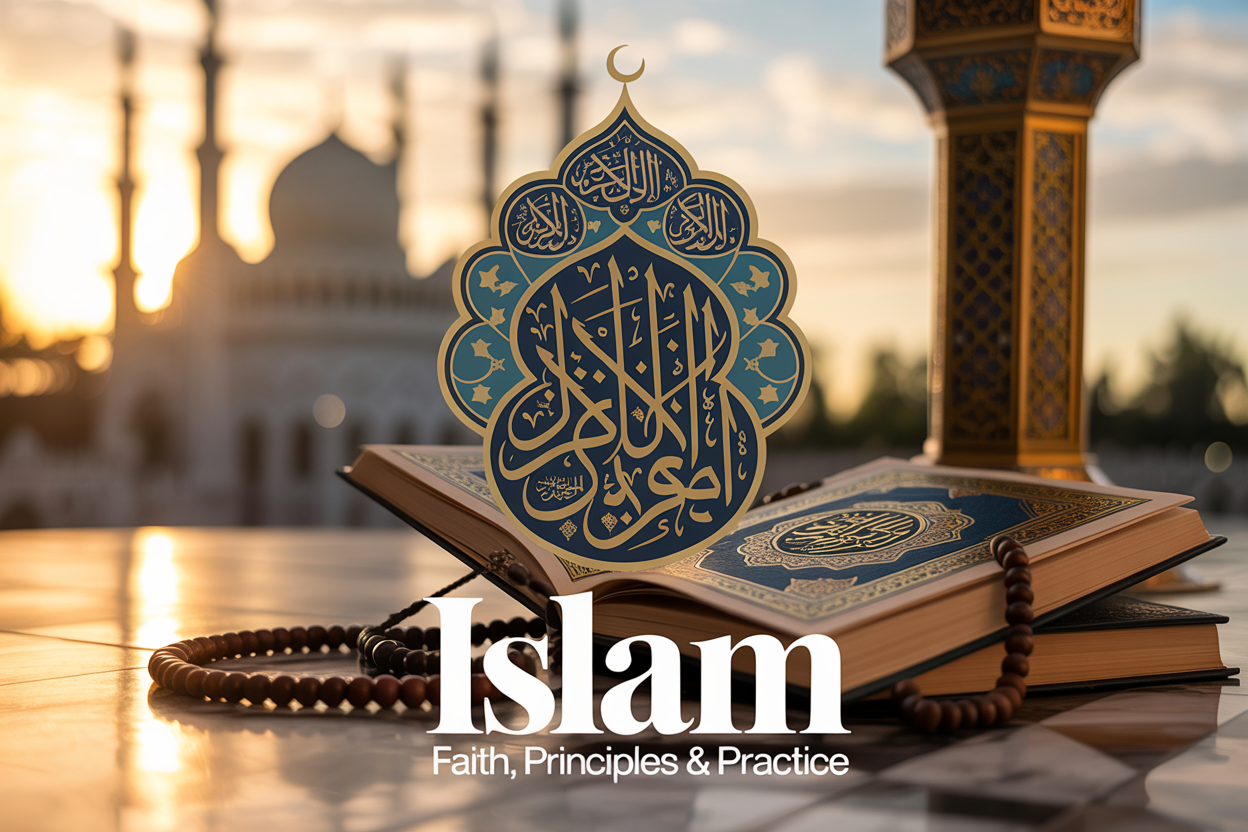
Islam is one of the world’s major religions, followed by nearly 2 billion Muslims across the globe. This comprehensive guide is designed for students, educators, and anyone curious about understanding Islam’s core beliefs, practices, and rich history.
We’ll explore the Five Pillars that form the foundation of Muslim worship and daily life, from prayer and fasting to pilgrimage to Mecca. You’ll also discover how Islamic law shapes ethical decisions and social structures, plus learn about the religion’s historical journey from 7th-century Arabia to today’s diverse global communities.
Whether you’re researching for academic purposes or simply want to better understand this influential faith, this overview covers the essential facts about Islam’s principles, beliefs, practices, and histories that have shaped civilizations for over 1,400 years.
Core Beliefs and Fundamental Principles of Islam
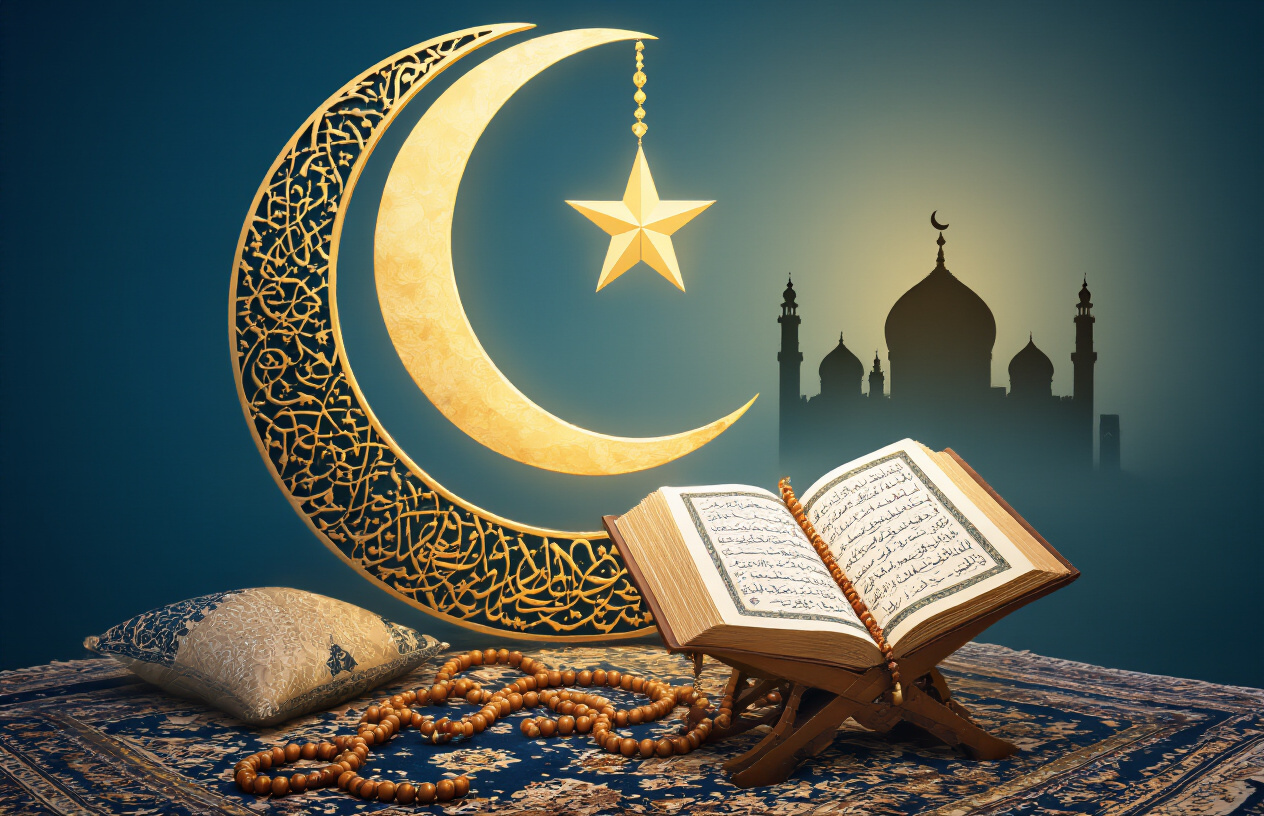
The Five Pillars – Your Path to Spiritual Fulfillment
The Five Pillars of Islam form the essential framework that guides every Muslim’s spiritual journey. These practices aren’t just religious obligations—they’re transformative experiences that shape character and strengthen faith.
Shahada stands as the foundation, the declaration that “There is no god but Allah, and Muhammad is His messenger.” This simple yet profound statement represents a complete worldview shift, acknowledging divine unity and prophetic guidance.
Salah, the daily prayers performed five times, creates rhythm in a believer’s life. These prayers—at dawn, midday, afternoon, sunset, and night—serve as spiritual anchors throughout the day, providing moments of reflection and connection with the divine.
Zakat transforms wealth into worship through mandatory charitable giving. Muslims contribute 2.5% of their savings annually, creating a social safety net that purifies both wealth and soul while addressing community needs.
Sawm during Ramadan brings spiritual discipline through fasting from dawn to sunset. This month-long practice develops empathy for the less fortunate while strengthening self-control and spiritual awareness.
Hajj, the pilgrimage to Mecca, represents the pinnacle of Islamic worship. This once-in-a-lifetime journey for those physically and financially able creates unity among believers from diverse backgrounds, all wearing simple white garments and performing identical rituals.
Six Articles of Faith – Understanding Islamic Worldview
Islamic faith rests on six fundamental beliefs that shape how Muslims understand existence, purpose, and destiny. These articles create a comprehensive worldview that addresses life’s biggest questions.
Belief in Allah encompasses understanding God as one, eternal, and supreme. Allah possesses ninety-nine beautiful names describing divine attributes like mercy, wisdom, and justice. This belief establishes the source of all creation and moral authority.
Belief in angels acknowledges spiritual beings created from light who serve Allah’s will. Angels like Gabriel deliver divine messages, while others record human deeds or guide souls after death. They represent Allah’s active involvement in creation.
Belief in divine scriptures recognizes Allah’s guidance through revealed books. While Muslims believe in the original Torah, Psalms, and Gospel, they consider the Quran the final, unchanged revelation that confirms and completes previous scriptures.
Belief in prophets honors messengers chosen to guide humanity. From Adam to Muhammad, prophets delivered Allah’s message across different times and places. Each prophet brought guidance suited to their community’s needs, with Muhammad as the final messenger.
Belief in the Day of Judgment establishes accountability for human actions. Everyone faces divine justice, with deeds weighed and eternal destinations determined based on faith and righteous acts.
Belief in divine destiny recognizes Allah’s knowledge and control over all events while preserving human free will and responsibility for choices made.
Monotheism (Tawhid) – The Foundation of Islamic Belief
Tawhid represents Islam’s core principle—absolute monotheism that goes beyond simply believing in one God. This concept permeates every aspect of Islamic thought and practice, creating a unified worldview that touches all areas of life.
The Arabic term derives from “wahid,” meaning one, but Tawhid encompasses much more than numerical unity. It represents God’s uniqueness in essence, attributes, and actions. No being shares divine qualities or deserves worship alongside Allah.
Tawhid ar-Rububiyyah acknowledges Allah as the sole creator, sustainer, and controller of the universe. Every natural phenomenon, from rainfall to planetary motion, reflects divine management of creation.
Tawhid al-Uluhiyyah demands exclusive worship of Allah alone. No intermediary, saint, or spiritual guide deserves veneration that belongs only to God. This principle shapes Islamic rejection of idolatry in all forms.
Tawhid al-Asma was-Sifat affirms God’s perfect names and attributes without comparison to creation. Allah’s mercy differs completely from human compassion, just as divine knowledge surpasses all created understanding.
This monotheistic foundation influences Islamic art, which avoids depicting divine imagery, and Islamic law, which derives authority from divine rather than human sources. Tawhid creates equality among believers since all stand equal before one God, regardless of race, wealth, or social status.
Prophet Muhammad as the Final Messenger
Muhammad ibn Abdullah holds a unique position in Islamic belief as the “Seal of the Prophets”—the final messenger sent to complete divine guidance for humanity. His role extends beyond delivering the Quran to modeling how revelation translates into daily living.
Born in Mecca around 570 CE, Muhammad received his first revelation at age forty through the angel Gabriel. The initial experience in the cave of Hira marked the beginning of twenty-three years of prophetic mission that would transform Arabian society and spread globally.
His character earned him the title “Al-Amin” (the trustworthy) even before his prophetic calling. This reputation for honesty and integrity lent credibility to his later message and demonstrated the moral transformation that Islamic teachings could achieve.
The Prophetic Mission combined spiritual guidance with practical reform. Muhammad addressed tribal warfare, economic injustice, and social inequality while establishing principles that remain relevant across cultures and centuries.
The Final Revelation through Muhammad completed previous scriptures, making the Quran the ultimate divine guidance. His teachings, recorded in hadith literature, provide detailed examples of implementing Quranic principles in real-world situations.
Universal Messenger status means Muhammad’s message transcends time and culture. While previous prophets addressed specific communities, his teachings apply to all humanity until the Day of Judgment, making him the final link in the chain of divine messengers.
His life example, called the Sunnah, serves as the practical interpretation of Islamic values, showing believers how to balance spiritual devotion with worldly responsibilities.
Sacred Texts and Divine Guidance
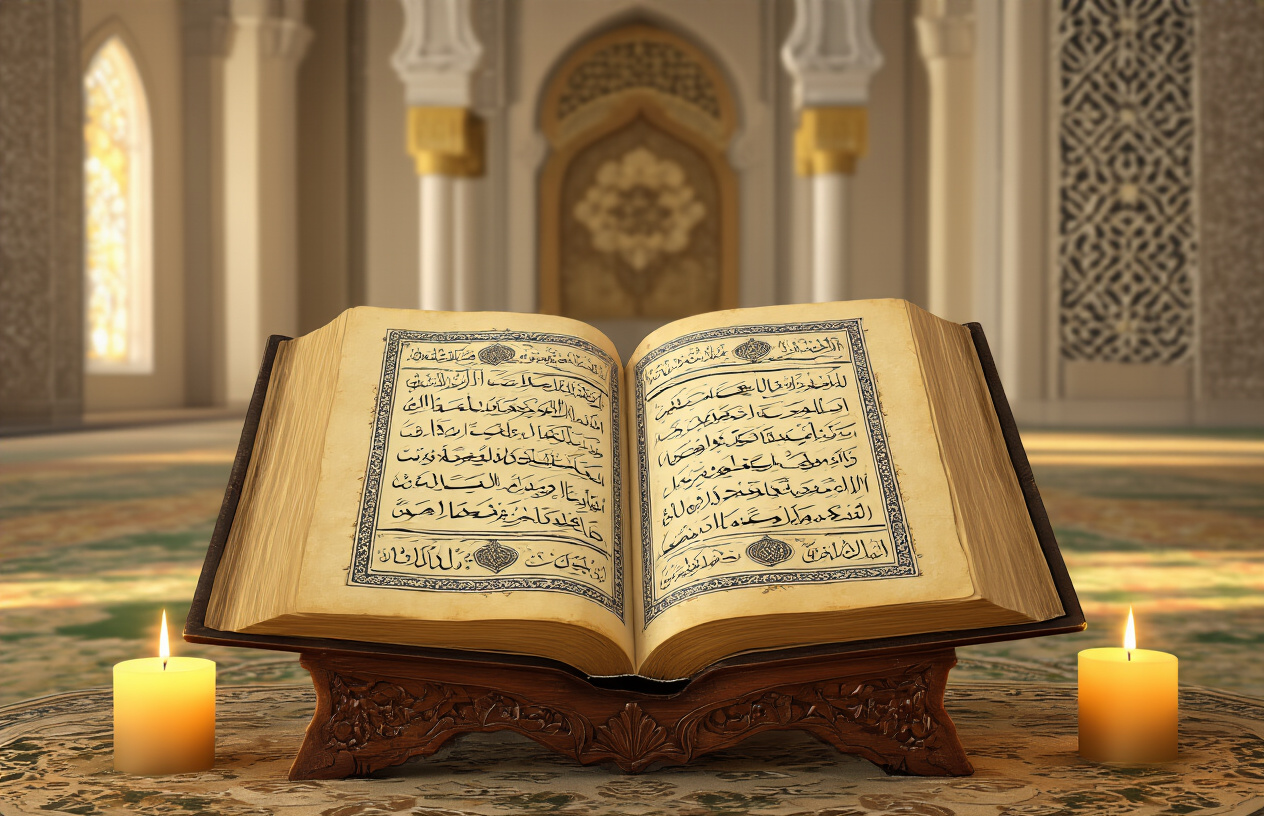
The Quran – Islam’s Holy Book and Practical Life Guide
The Quran stands as the central holy book of Islam, believed by Muslims to be the direct word of Allah revealed to Prophet Muhammad through the angel Gabriel (Jibril) over a period of 23 years. Unlike other religious texts that may have been compiled by multiple authors or edited over time, Muslims believe the Quran remains unchanged from its original revelation, preserved in its exact form since the 7th century.
Written in classical Arabic, the Quran contains 114 chapters called “suras,” ranging from just a few verses to several hundred. Each chapter addresses different aspects of life, from spiritual guidance and moral principles to social justice and personal conduct. The text covers everything from family relationships and business ethics to governance and environmental stewardship.
What makes the Quran unique is its dual role as both a spiritual guide and a practical manual for daily living. Muslims don’t just read it for worship – they turn to it for guidance on making decisions, resolving conflicts, and understanding their purpose in life. The book addresses questions like how to treat neighbors, conduct business fairly, care for the environment, and maintain strong family bonds.
The Quran’s poetic language and rhythmic verses make it particularly powerful when recited aloud. Many Muslims memorize large portions or even the entire text, a practice called “hifz.” This oral tradition has helped preserve the Quran’s authenticity across centuries and cultures.
Hadith and Sunnah – Following the Prophet’s Example
While the Quran provides the fundamental framework of Islamic belief, the Hadith and Sunnah offer practical examples of how to live these principles. The Hadith consists of recorded sayings, actions, and approvals of Prophet Muhammad, while the Sunnah refers to his overall way of life and practices.
Think of the Hadith as a detailed manual that shows how the Quran’s teachings were actually implemented. When the Quran says to be kind to parents, the Hadith provides specific examples of what that kindness looks like in real situations. When the Quran mentions prayer, the Sunnah demonstrates exactly how Prophet Muhammad prayed, including the physical movements, timing, and words used.
The collection and verification of Hadith became a sophisticated science in Islamic scholarship. Early Muslim scholars developed rigorous methods to authenticate these reports, examining the credibility of narrators and the chain of transmission. They classified Hadith into categories based on reliability, creating a system that scholars still use today.
| Category | Description | Reliability Level |
|---|---|---|
| Sahih | Sound/Authentic | Highest |
| Hasan | Good | High |
| Da’if | Weak | Low |
| Mawdu | Fabricated | Rejected |
The most respected Hadith collections include Sahih al-Bukhari and Sahih Muslim, compiled by scholars who spent decades traveling across the Islamic world to gather and verify authentic reports. These collections contain thousands of narrations covering topics from personal hygiene and social etiquette to complex legal and ethical questions.
How Islamic Scripture Shapes Daily Decision Making
Islamic scripture doesn’t just sit on a shelf collecting dust – it actively shapes how practicing Muslims approach everyday choices and challenges. The Quran and Hadith together create a comprehensive framework that helps believers navigate everything from career decisions to family disputes.
When facing a difficult choice, many Muslims engage in a process called “istisharah,” which involves seeking guidance through prayer and reflection on Islamic teachings. They might search for relevant Quranic verses or Hadith that address similar situations, consulting with knowledgeable community members or religious scholars when needed.
For business decisions, Islamic scripture emphasizes honesty, fairness, and avoiding exploitative practices. The prohibition of “riba” (interest-based transactions) has led to the development of entire Islamic banking systems that operate on profit-sharing and asset-backed financing instead of traditional interest rates.
Family relationships receive extensive guidance in Islamic texts. The Quran outlines rights and responsibilities between spouses, parents and children, and extended family members. When conflicts arise, families often turn to these teachings for resolution strategies that emphasize forgiveness, communication, and mutual respect.
Even daily routines reflect scriptural influence. The five daily prayers create natural breaks for reflection and spiritual connection. Dietary laws determine food choices, while guidelines on cleanliness and personal conduct shape social interactions. The concept of “halal” (permissible) and “haram” (forbidden) helps Muslims evaluate everything from entertainment choices to investment opportunities.
During challenging times, verses from the Quran and prophetic traditions provide comfort and perspective. Many Muslims memorize specific passages they can recall during difficult moments, finding strength in the belief that their struggles have meaning and that divine guidance is always available to those who seek it sincerely.
Essential Islamic Practices and Worship
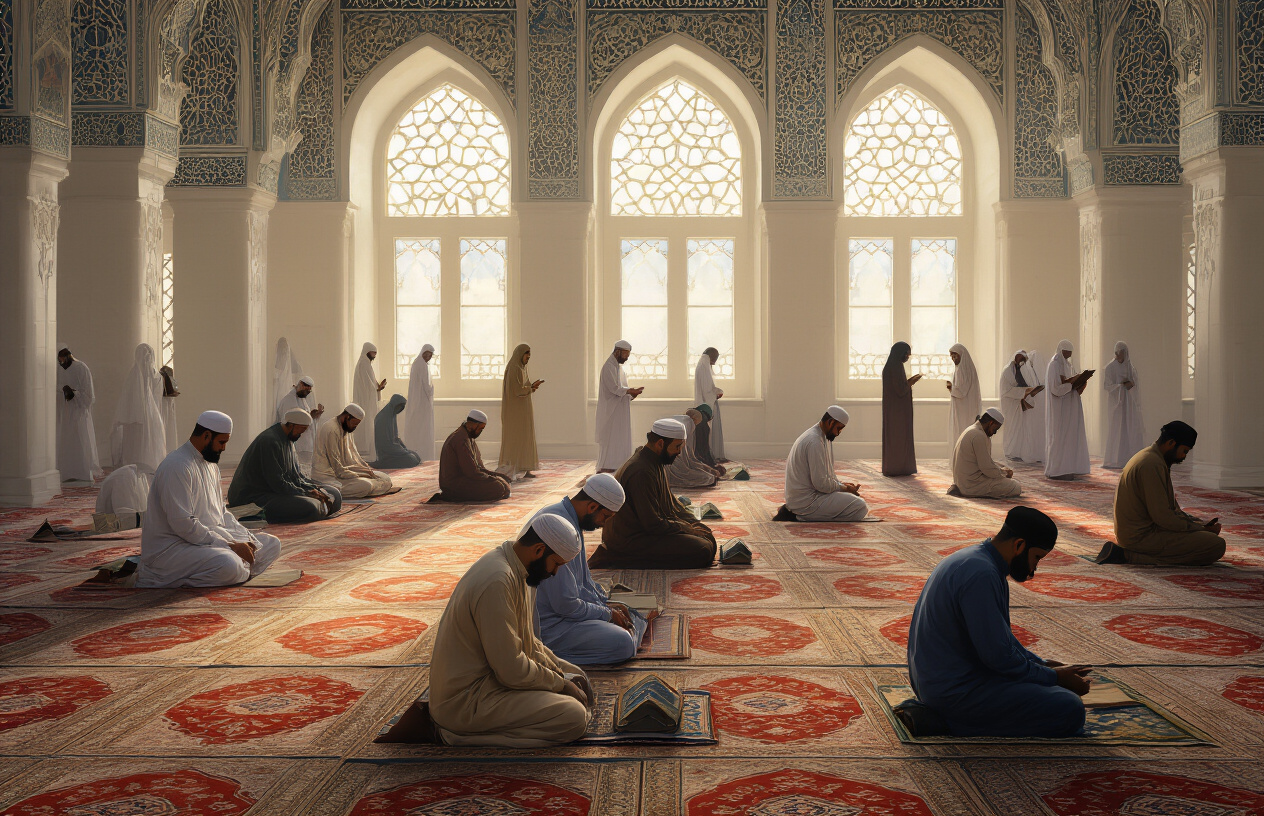
Daily Prayer (Salah) – Connecting with Allah Five Times Daily
Prayer stands at the heart of Islamic worship, creating a rhythmic connection between believers and Allah throughout each day. Muslims perform five distinct prayers at specific times: Fajr before dawn, Dhuhr at midday, Asr in the afternoon, Maghrib at sunset, and Isha after nightfall. Each prayer session involves physical movements including standing, bowing, prostrating, and sitting while reciting verses from the Quran and supplications in Arabic.
Before prayer begins, Muslims perform wudu (ablution), a ritual washing that purifies the body and prepares the mind for spiritual connection. The physical cleansing of hands, face, arms, head, and feet symbolizes the inner purification of the soul. Prayer can be performed anywhere clean, though many Muslims prefer using a prayer mat that creates a sacred space.
The direction of prayer, called qibla, always faces toward the Kaaba in Mecca, unifying Muslims worldwide in a single orientation. During prayer, believers focus entirely on their relationship with Allah, setting aside worldly concerns and distractions. This regular practice develops discipline, mindfulness, and spiritual awareness while reinforcing Islamic values throughout daily life.
Fasting During Ramadan – Spiritual Purification and Self-Discipline
Ramadan transforms the Muslim calendar year with a month-long period of fasting, reflection, and community bonding. From dawn until sunset, practicing Muslims abstain from food, drink, smoking, and marital relations. This physical restraint serves multiple spiritual and social purposes, developing self-control while increasing empathy for those who experience hunger involuntarily.
The fast begins before sunrise with suhur, a pre-dawn meal that provides energy for the day ahead. Breaking the fast at sunset, called iftar, often becomes a communal celebration where families and communities gather to share meals and strengthen relationships. Many mosques organize community iftars, welcoming people from all backgrounds to participate in this tradition.
Beyond the physical aspects, Ramadan emphasizes increased prayer, Quran recitation, charity, and moral behavior. Muslims believe that good deeds receive greater spiritual rewards during this holy month, encouraging acts of kindness, forgiveness, and generosity. The experience teaches patience, gratitude, and spiritual discipline while creating a sense of solidarity among Muslims worldwide who share this common experience.
Special evening prayers called Tarawih add extra worship opportunities, and many Muslims attempt to complete the entire Quran during the month through daily recitations.
Pilgrimage to Mecca (Hajj) – The Ultimate Spiritual Journey
Hajj represents the pinnacle of Islamic worship, requiring every financially and physically capable Muslim to make the journey to Mecca at least once in their lifetime. This pilgrimage occurs during the final month of the Islamic calendar, bringing together millions of believers from every corner of the globe in a remarkable display of unity and devotion.
The pilgrimage follows specific rituals that commemorate the actions of Prophet Abraham, his wife Hagar, and their son Ishmael. Pilgrims wear simple white garments called ihram, removing distinctions of wealth, nationality, or social status. This uniform dress symbolizes equality before Allah and creates a powerful visual representation of human brotherhood.
Key rituals include circling the Kaaba seven times (tawaf), walking between the hills of Safa and Marwa, standing in prayer at Mount Arafat, and symbolically stoning pillars representing Satan. Each ritual carries deep spiritual significance and connects pilgrims to thousands of years of Islamic tradition. The physical challenges of completing these rites in massive crowds teach patience, perseverance, and humility.
Many pilgrims describe Hajj as life-changing, returning home with renewed faith and a broader perspective on humanity. The experience creates lasting bonds between people from different cultures and backgrounds, reinforcing Islam’s message of universal brotherhood.
Zakat – Transforming Lives Through Charitable Giving
Zakat operates as both a spiritual purification and a social justice system within Islamic society. This mandatory charitable giving requires Muslims who meet specific wealth thresholds to donate 2.5% of their accumulated wealth annually to designated categories of recipients. The practice recognizes that wealth belongs ultimately to Allah, with individuals serving as trustees responsible for sharing their blessings.
Eight categories of people can receive zakat: the poor, the needy, zakat collectors, those whose hearts need softening toward Islam, those in bondage, debtors, those fighting in Allah’s path, and travelers in need. This comprehensive system addresses various forms of hardship and creates a safety net for society’s most vulnerable members.
Beyond the financial impact, zakat purifies the giver’s wealth and soul by reducing attachment to material possessions and developing generosity. Many Muslims report that regular zakat giving increases their overall prosperity and brings spiritual satisfaction. The practice also strengthens community bonds by creating direct connections between those who have resources and those who need assistance.
Modern zakat distribution often involves organized charities and institutions that ensure funds reach appropriate recipients efficiently. Some countries collect zakat through government systems, while others rely on individual responsibility and private charitable organizations.
Community Prayer and Mosque Etiquette
Mosques serve as spiritual centers where Muslims gather for communal worship, learning, and social interaction. Friday congregational prayers (Jummah) hold special significance, bringing communities together for a weekly sermon and prayer that strengthens collective identity and shared values. The imam leads the congregation through synchronized movements and recitations that create a powerful sense of unity.
Proper mosque etiquette includes removing shoes before entering, dressing modestly, and maintaining cleanliness. Men and women typically pray in separate areas or sections, though both participate equally in the worship service. Visitors of all faiths are generally welcome, though they should respect local customs and ask about appropriate behavior.
During prayer, participants stand in straight rows facing Mecca, following the imam’s lead through each stage of the service. The experience reinforces community bonds while allowing individual spiritual connection. Many mosques offer additional services like Quran study, Arabic classes, marriage counseling, and social support programs.
The architectural design of mosques often includes features like minarets for the call to prayer, mihrab indicating the direction of Mecca, and minbar (pulpit) for sermons. These elements create spaces specifically designed to facilitate worship and community gathering.
Historical Development and Expansion of Islam
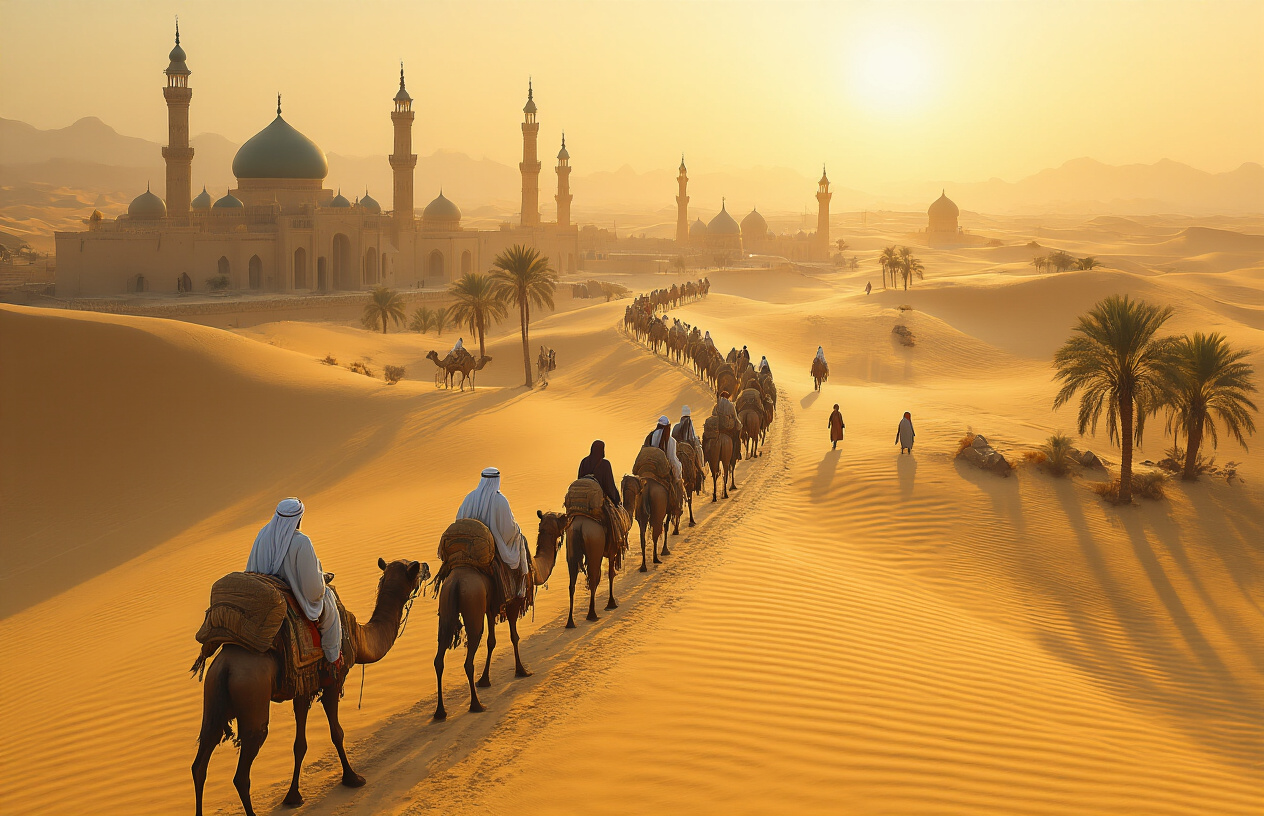
Birth of Islam in 7th Century Arabia
In the bustling trade city of Mecca around 610 CE, Muhammad ibn Abdullah began receiving what Muslims believe were divine revelations through the angel Gabriel. At that time, the Arabian Peninsula was a patchwork of tribal societies, with most people worshipping multiple gods and goddesses. The Kaaba in Mecca served as a pilgrimage site housing hundreds of idols from different tribes.
Muhammad’s message was revolutionary for its time – the belief in one God (Allah) and the call for social justice, charity, and moral reform. His teachings challenged the existing power structures and economic systems that benefited the wealthy merchant class. The early Muslim community faced severe persecution, forcing many to flee to Abyssinia for safety.
The turning point came in 622 CE with the Hijra, Muhammad’s migration to Medina. This event marks the beginning of the Islamic calendar and established the first Muslim community-state. In Medina, Muhammad served as both spiritual leader and political ruler, creating a constitution that unified the diverse tribes under Islamic principles.
By Muhammad’s death in 632 CE, most of the Arabian Peninsula had embraced Islam. The religion had transformed from a small persecuted group into a unified political and spiritual force ready for expansion.
The Rashidun Caliphate – Early Islamic Leadership
The period following Muhammad’s death brought the challenge of succession, leading to the establishment of the Rashidun (Rightly-Guided) Caliphate under four successive leaders. Abu Bakr, the first caliph (632-634 CE), faced immediate threats from tribal rebellions known as the Ridda Wars. His decisive military campaigns consolidated Muslim control over Arabia and launched the first major expansion beyond the peninsula.
Under Umar ibn al-Khattab (634-644 CE), Islamic armies achieved stunning victories against the Byzantine and Sassanian empires. The conquest of Jerusalem in 638 CE and the capture of Damascus, Iraq, and Egypt expanded the Islamic empire dramatically. Umar’s administrative genius created efficient governance systems that respected local customs while implementing Islamic law.
Uthman ibn Affan (644-656 CE) continued the expansion into North Africa and Central Asia while standardizing the Quranic text. However, his reign ended in controversy and assassination, leading to the caliphate of Ali ibn Abi Talib (656-661 CE). Ali’s period was marked by civil wars, including battles against Aisha (Muhammad’s widow) and Muawiya, the governor of Syria.
These internal conflicts, particularly the Battle of Karbala in 680 CE where Ali’s son Hussein was killed, created the major theological and political split between Sunni and Shia Islam that continues today.
Islamic Golden Age – Achievements in Science and Culture
The Islamic Golden Age, spanning roughly from the 8th to the 13th centuries, represents one of history’s most remarkable periods of intellectual achievement. Baghdad, established as the Abbasid capital in 762 CE, became the epicenter of learning, attracting scholars from across the known world regardless of their religious background.
The House of Wisdom in Baghdad functioned as a massive library, translation center, and research institute. Muslim scholars preserved and translated Greek, Persian, and Indian texts, saving countless works that might otherwise have been lost. They didn’t just preserve this knowledge – they built upon it, making groundbreaking discoveries in mathematics, astronomy, medicine, and philosophy.
| Field | Key Contributions | Notable Figures |
|---|---|---|
| Mathematics | Algebra, decimal system | Al-Khwarizmi, Al-Kindi |
| Medicine | Surgical techniques, medical encyclopedias | Al-Razi, Ibn Sina |
| Astronomy | Star catalogs, improved astrolabe | Al-Battani, Al-Biruni |
| Philosophy | Synthesis of Aristotelian thought | Al-Farabi, Averroes |
Cities like Cordoba, Cairo, and Samarkand became centers of learning where Muslims, Christians, and Jews collaborated on scholarly projects. This period saw the establishment of the world’s first universities, hospitals with medical schools, and libraries containing hundreds of thousands of manuscripts.
Spread Across Continents – From Spain to Southeast Asia
Islam’s expansion across three continents happened through various means – military conquest, trade relationships, missionary activities, and gradual cultural absorption. The conquest of Spain in 711 CE established Muslim rule that would last for nearly eight centuries, creating a unique Andalusian Islamic civilization that fostered remarkable cultural achievements.
Trade routes played a crucial role in Islam’s spread. Muslim merchants carried their faith along the Silk Road to Central Asia and China, across the Indian Ocean to Southeast Asia, and through trans-Saharan routes into West Africa. In places like Indonesia, Malaysia, and parts of Africa, Islam spread primarily through peaceful trade relationships rather than military conquest.
The conversion process varied significantly by region. In some areas, local rulers adopted Islam, leading to gradual conversion of their subjects. In others, Sufi missionaries attracted followers through their mystical teachings and charitable works. Many societies adapted Islam to their existing cultural practices, creating diverse regional expressions of the faith.
By the 15th century, Islam had established major presences in:
- Europe: Spain, parts of Eastern Europe through Ottoman expansion
- Africa: North Africa, East African coast, West African kingdoms like Mali
- Asia: Central Asia, Indian subcontinent, Southeast Asian archipelago
- Middle East: Complete dominance from Turkey to Yemen
This geographic diversity created a rich tapestry of Islamic cultures, each maintaining core religious principles while developing unique local traditions and practices.
Islamic Law and Ethical Framework
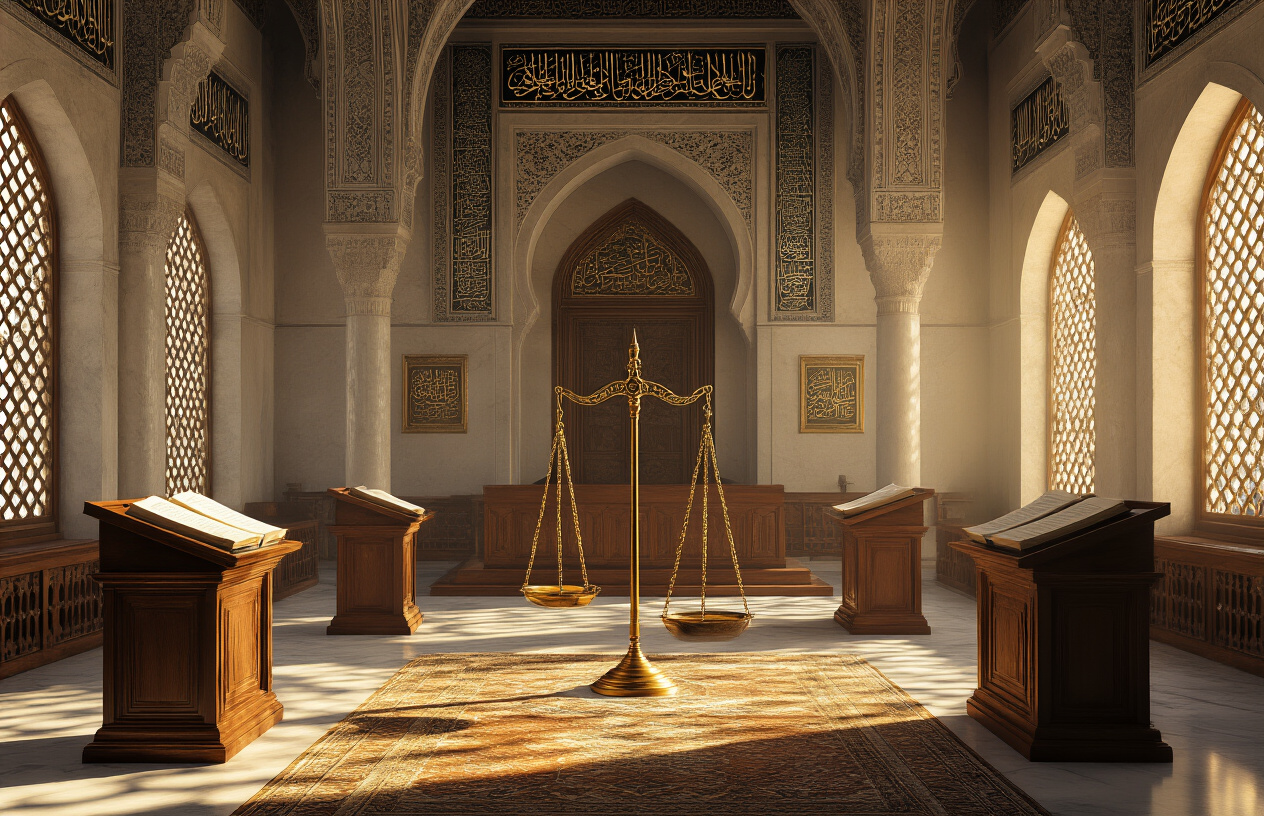
Sharia – Understanding Islamic Legal Principles
Sharia represents the comprehensive legal and moral framework that guides Muslim life, derived from the Quran and the Sunnah (Prophet Muhammad’s teachings and practices). Rather than being a rigid code, Sharia functions as a dynamic system that adapts to different contexts while maintaining core principles. The word itself means “path to water” in Arabic, symbolizing guidance toward spiritual and worldly well-being.
The sources of Islamic law follow a clear hierarchy: the Quran stands as the primary source, followed by authentic Hadith (prophetic traditions), then scholarly consensus (Ijma), and analogical reasoning (Qiyas). Islamic jurisprudence recognizes five categories of human actions: obligatory (Fard), recommended (Mustahabb), permissible (Mubah), discouraged (Makruh), and forbidden (Haram).
Sharia covers both personal worship and social interactions. While Western media often focuses on criminal law, this represents only a small portion of Islamic jurisprudence. Most of Sharia deals with family matters, commercial transactions, and personal conduct. The flexibility within Islamic law allows different schools of thought (madhabs) to interpret and apply principles according to local customs and circumstances, provided they don’t contradict fundamental Islamic values.
Family Values and Social Justice in Islam
Islamic family structure emphasizes mutual respect, responsibility, and compassion among family members. Marriage is considered half of faith, encouraging stable partnerships based on love, mercy, and shared religious values. Both spouses have defined rights and responsibilities – husbands are expected to provide financial support and protection, while wives traditionally manage household affairs and child-rearing, though modern interpretations allow for more flexible arrangements.
Children hold special status in Islam, with parents obligated to provide proper education, moral guidance, and financial support. The Quran specifically mentions kindness to parents as second only to worship of Allah, making care for elderly parents a religious duty. Extended family networks remain important, with Islamic teachings encouraging strong bonds among relatives and mutual assistance during difficult times.
Social justice forms a cornerstone of Islamic values, with the wealthy obligated to support the less fortunate through Zakat (obligatory charity) and voluntary giving (Sadaqah). Islam prohibits discrimination based on race, ethnicity, or social status, famously declaring that all humans are equal before Allah. The religion emphasizes protecting the rights of orphans, widows, and the marginalized, viewing social welfare as a community responsibility rather than individual charity.
Business Ethics and Financial Practices
Islamic finance operates on principles that promote fairness, transparency, and shared risk. The prohibition of interest (Riba) encourages partnerships and profit-sharing arrangements rather than exploitative lending practices. This creates a system where financial institutions and customers share both profits and losses, promoting more ethical business relationships.
Key principles include the prohibition of excessive uncertainty (Gharar) in contracts, which eliminates gambling-like transactions and speculative trading. Islamic finance also forbids investment in industries considered harmful, such as alcohol, gambling, or weapons manufacturing. These restrictions encourage investment in productive, socially beneficial enterprises.
Modern Islamic banking offers alternatives like Murabaha (cost-plus financing), Ijara (leasing), and Musharaka (joint ventures). These instruments allow Muslims to participate in contemporary financial systems while maintaining religious compliance. The growth of Islamic finance globally demonstrates how religious principles can adapt to modern economic needs while preserving ethical foundations.
Conflict Resolution and Community Harmony
Islamic approach to conflict resolution emphasizes justice, mercy, and reconciliation over punishment. The Quran repeatedly encourages forgiveness and peaceful settlement of disputes, viewing reconciliation as superior to retaliation. This philosophy creates frameworks for resolving conflicts at personal, family, and community levels.
Mediation plays a central role in Islamic dispute resolution, with community elders or religious leaders often serving as neutral facilitators. The process focuses on understanding underlying issues, restoring relationships, and preventing future conflicts rather than simply determining fault. This approach recognizes that community harmony often matters more than strict legal victory.
Islamic teachings promote tolerance and coexistence with people of different faiths and backgrounds. The concept of “La ikraha fi al-din” (no compulsion in religion) establishes religious freedom as a fundamental principle. Muslims are encouraged to engage positively with diverse communities while maintaining their own religious identity, creating space for peaceful pluralistic societies where different groups can thrive together.
Denominations and Contemporary Islam
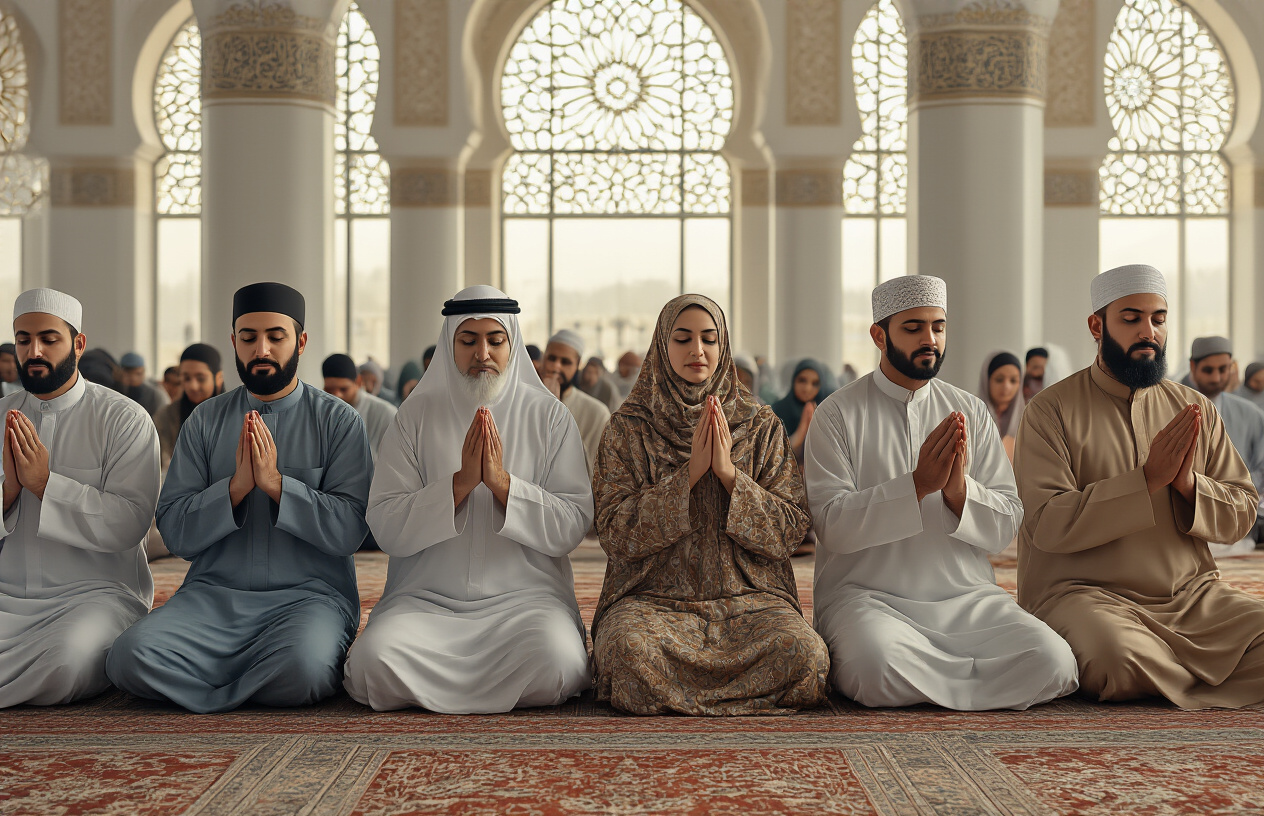
Sunni and Shia – Major Branches Explained
The split between Sunni and Shia Muslims traces back to the death of Prophet Muhammad in 632 CE, creating the most significant division in Islam. The disagreement centered on who should lead the Muslim community. Sunnis believed that Abu Bakr, Muhammad’s close companion, was the rightful successor, while Shias supported Ali ibn Abi Talib, the Prophet’s cousin and son-in-law.
Sunni Islam represents about 85-90% of the world’s Muslim population. The name comes from “Ahl al-Sunnah,” meaning “people of the tradition.” Sunnis follow the Sunnah (traditions) of Prophet Muhammad and accept the first four caliphs as legitimate successors. They emphasize the collective wisdom of the Muslim community and rely on scholarly consensus for religious interpretation.
Shia Muslims, comprising 10-15% of Muslims globally, believe that Ali and his descendants were the only legitimate successors to Muhammad. They follow a line of twelve Imams, considering them divinely appointed spiritual guides. Shia Islam places greater emphasis on the authority of these Imams and their interpretations of Islamic law.
| Aspect | Sunni | Shia |
|---|---|---|
| Leadership | Caliphs chosen by community | Imams divinely appointed |
| Population | 85-90% of Muslims | 10-15% of Muslims |
| Religious Authority | Scholarly consensus | Imam’s guidance |
| Major Centers | Saudi Arabia, Egypt, Turkey | Iran, Iraq, Lebanon |
Both branches share core Islamic beliefs including the Five Pillars, belief in one God (Allah), and reverence for the Quran. Their differences mainly involve religious authority, leadership succession, and certain ritual practices.
Sufi Mysticism – The Spiritual Dimension of Islam
Sufism represents the mystical and spiritual dimension of Islam, focusing on the inner purification of the soul and direct personal experience with the Divine. Sufi practitioners, known as “sufis” or “dervishes,” seek to transcend the material world and achieve spiritual unity with Allah through various practices including meditation, prayer, music, and dance.
The Sufi path emphasizes several key concepts:
- Dhikr (Remembrance of God): Repetitive recitation of God’s names and attributes
- Fana (Self-annihilation): The dissolution of the ego to achieve spiritual unity
- Tariqa (Spiritual Path): Structured guidance under a spiritual master (sheikh or pir)
- Sama (Spiritual Listening): Use of music and poetry for spiritual elevation
Sufi orders, called tariqas, emerged as organized groups following specific spiritual lineages and practices. Famous orders include the Mevlevi (whirling dervishes), Qadiriyya, and Naqshbandiyya. Each order has its own methods of spiritual training and rituals, though all aim for the same goal of spiritual purification and closeness to God.
Sufi poetry and literature have profoundly influenced Islamic culture, with masters like Rumi, Hafez, and Ibn Arabi creating works that speak to universal spiritual themes. Their writings often use metaphors of love, wine, and union to describe the spiritual journey toward the Divine.
While some orthodox Muslims have criticized certain Sufi practices as innovations, Sufism has played a crucial role in spreading Islam, particularly in regions like Central Asia, India, and West Africa, where Sufi missionaries emphasized Islam’s spiritual rather than legal aspects.
Islam in the Modern World – Adapting to Contemporary Challenges
Modern Islam faces complex challenges as Muslim communities navigate between preserving traditional values and adapting to contemporary realities. Globalization, technological advancement, and political changes have created new contexts for Islamic practice and interpretation.
Educational and Scientific Integration
Many Muslim scholars advocate for harmonizing Islamic teachings with modern science and education. Countries like Malaysia and the UAE have developed educational systems that combine Islamic values with contemporary scientific knowledge. This approach addresses the false dichotomy between religious faith and scientific inquiry.
Political Participation and Governance
Muslims worldwide engage in diverse political systems, from democratic republics to constitutional monarchies. Countries like Indonesia, Turkey, and Bangladesh demonstrate how Islamic societies can function within democratic frameworks while maintaining their religious identity. The concept of “Islamic democracy” continues to evolve as Muslim nations experiment with governance models that reflect both Islamic principles and modern political realities.
Women’s Rights and Gender Issues
Contemporary Islamic discourse increasingly addresses women’s rights and gender equality. Progressive Muslim scholars reinterpret traditional texts to support women’s education, professional participation, and leadership roles. Countries show varying approaches, from Saudi Arabia’s recent reforms allowing women to drive and attend sporting events, to more restrictive interpretations elsewhere.
Technology and Digital Islam
The digital age has transformed Islamic practice and learning. Muslims use smartphone apps for prayer times and Qibla direction, access online Quranic study platforms, and participate in virtual religious communities. Social media has democratized Islamic knowledge, allowing ordinary believers to engage with religious content directly.
Economic Systems and Finance
Islamic finance has emerged as a significant global sector, offering Sharia-compliant banking and investment products. This system prohibits interest (riba) and speculation while promoting profit-sharing and asset-backed transactions. Countries like Malaysia have become major centers for Islamic banking, demonstrating how traditional principles can operate within modern economic frameworks.
Interfaith Relations and Pluralism
Contemporary Muslims increasingly engage in interfaith dialogue and cooperation. Many Muslim communities actively participate in multicultural societies while maintaining their religious identity. This engagement challenges both Muslims and non-Muslims to find common ground on issues like social justice, environmental protection, and human rights.
The diversity within modern Islam reflects its adaptability and the creative ways Muslim communities address contemporary challenges while staying true to their core beliefs and values.

Islam stands as one of the world’s major religions, built on clear principles that guide over 1.8 billion people worldwide. The five pillars create a foundation for worship and community connection, while the Quran and Hadith provide timeless guidance for daily life. From its origins in 7th-century Arabia to its global presence today, Islam has shaped civilizations, legal systems, and moral frameworks across continents.
The diversity within Islam shows through its different denominations and modern interpretations, yet the core message remains consistent across all branches. Whether someone is learning about Islamic history, exploring its ethical teachings, or understanding its practices, the religion offers a comprehensive worldview that addresses spiritual, social, and personal aspects of life. For those interested in deepening their understanding, engaging with local Muslim communities or reading authentic Islamic sources can provide valuable insights into this rich and influential faith tradition.

Nasir Uddin is a dedicated writer and researcher at BanglaLook.com, where he explores topics related to education, Bangladeshi culture, lifestyle, and travel. With a strong passion for learning and storytelling, he blends personal observation with well-researched insights to help readers better understand Bangladesh and the world around them.